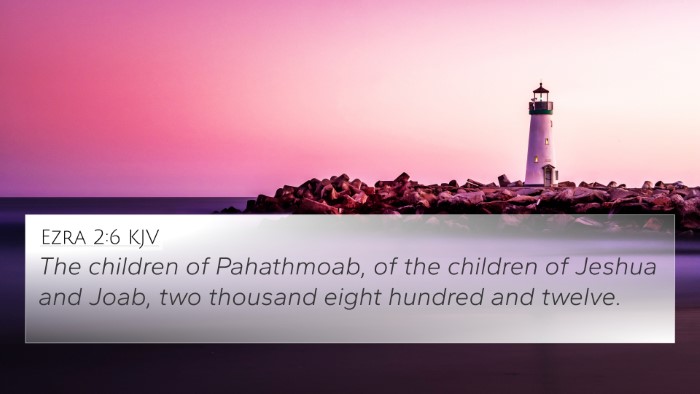Understanding Ezra 10:30
In Ezra 10:30, the context revolves around the actions of the Israelites as they resolve to correct their relations with God after the return from exile. This passage specifically mentions individuals by name, illustrating the importance of accountability and the restoration of a proper community of faith.
Meaning of Ezra 10:30
This verse highlights the seriousness with which the returning exiles addressed their previous sins, particularly regarding intermarriage with foreign nations, which compromised their identity and worship of Yahweh. Each named individual symbolizes a larger group struggling with these issues, and their mention denotes a collective recognition of wrongdoing and a commitment to restoration.
Insights from Public Domain Commentaries
-
Matthew Henry's Commentary:
Henry emphasizes the necessity of addressing sin within the community, noting how the act of naming individuals indicates both a public confession of sin as well as a clear call to repentance. He contends that such a listing reminds the people that their sins have real consequences that require acknowledgment and rectification.
-
Albert Barnes' Notes:
Barnes points out that the naming of these individuals serves as a historical record of those who took a stand for righteousness. It illustrates the process of reestablishing a covenant relationship with God by correcting past mistakes and returning to the law, highlighting the theme of renewal and restoration prevalent in the book of Ezra.
-
Adam Clarke's Commentary:
Clarke draws attention to the importance of societal integrity reflected in this verse. He notes that it underlines a collective responsibility toward God’s commandments, suggesting that each individual’s commitment to holiness affects the entire community's standing before God. The mentioned names serve both as an acknowledgment of past errors and a pledge for what is to come.
Connections with Other Bible Verses
Ezra 10:30 connects with various other scriptural passages that reinforce its themes:
- Malachi 2:10-11: Discusses the profanation of the covenant through intermarriage.
- Nehemiah 13:23-27: Addresses the same issue of intermarriage and its implications.
- Deuteronomy 7:3-4: Commands the Israelites not to intermarry with foreign nations to avoid turning their hearts away from God.
- 2 Corinthians 6:14: Warns against unequal yoking with unbelievers, drawing a New Testament parallel to the concerns raised in Ezra.
- Psalms 106:34-36: Reflects on Israel's history of mixing with other nations and the consequences they faced.
- Romans 12:2: Encourages believers not to conform to the world, echoing Ezra's call for purity and dedication to God.
- Titus 2:11-12: Discourses on the grace that teaches us to live righteously, aligning with the repentant attitude in Ezra’s context.
Thematic Connections
The themes of restoration, accountability, and communal integrity present in Ezra 10:30 are deeply rooted in the overarching narrative of the Old Testament. This verse serves as a demonstration of the Israelites' desire to return to their covenantal responsibilities. By understanding this scripture, modern readers can appreciate the significance of community and individual accountability before God.
Tools for Bible Cross-Referencing
For those seeking deeper insight into the connections between scriptures, several tools can aid in the process:
- Bibles with built-in cross-references: These editions provide scripture links for easy exploration.
- Online Bible concordances: Websites that host search functionalities for finding specific verse references by theme.
- Commentaries and study Bibles: Offer insights that illustrate the connections between different biblical texts.
- Cross-reference guides: These resources compile linked verses, highlighting key themes and connections across the Bible.
Conclusion
Ezra 10:30 serves as a powerful reminder of the importance of accountability before God, the need for communal integrity, and the ongoing journey of restoration for believers. Through the examination of this verse alongside its cross-references, we gain a deeper understanding of not only Ezra’s message but also the broader themes of the biblical narrative.





